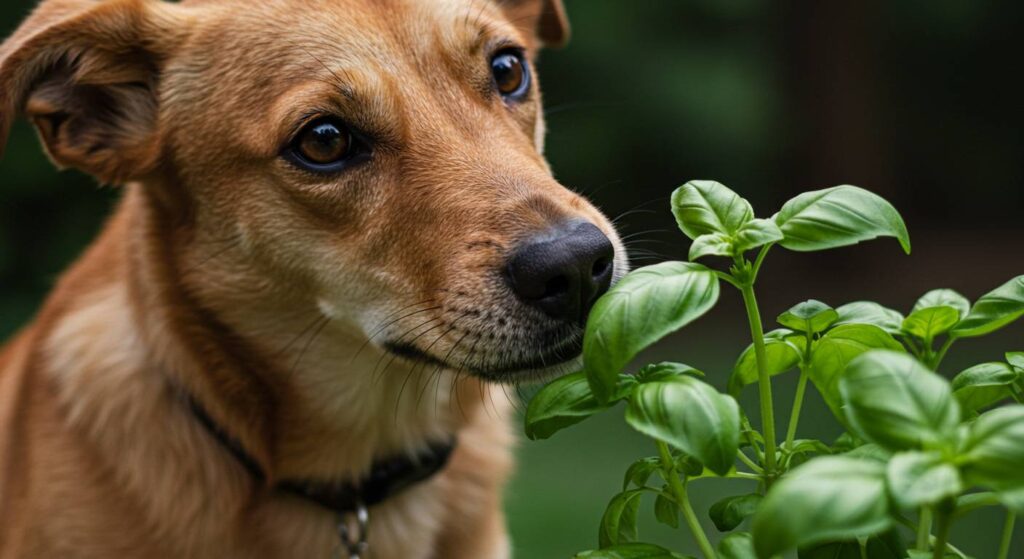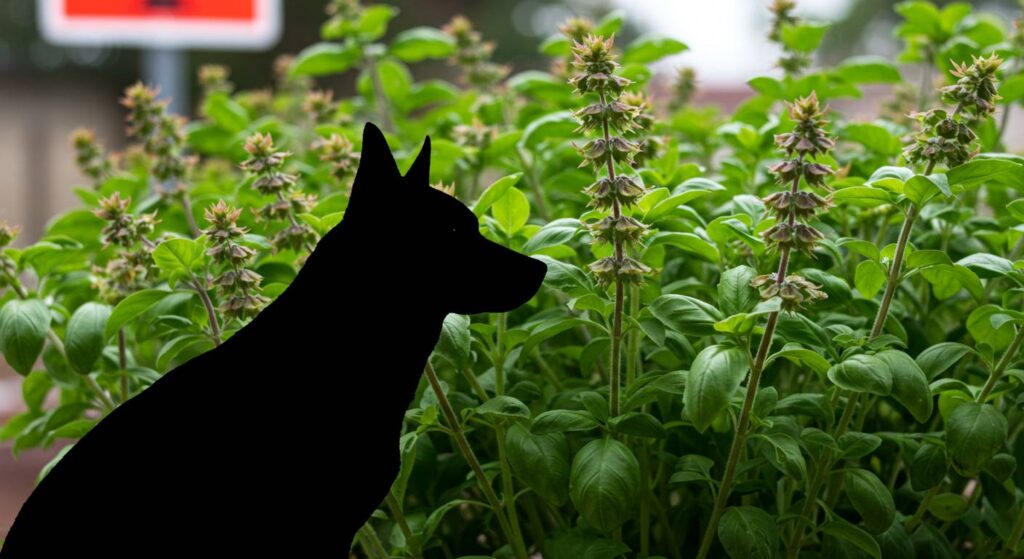Eight years of coaxing life from soil, and there I was, Kalsoom Imran, beaming at my thriving herb garden. Then, my golden retriever, Gus, decided the basil was his new chew toy. That’s when I wondered, is basil bad for dogs?
Can Dogs Eat Basil? Understanding the Basics
Is Basil Safe for My Dog? The Short Answer
Okay, let’s get right to it. You’re probably here because you’ve got a curious pup and a basil plant, or maybe you’ve found a rogue leaf on the floor and your furry friend has already gobbled it up. The short answer is: generally, yes, basil is safe for my dog in small quantities. It’s not considered toxic to dogs, which is a relief, right?
But, like with most things, there’s more to the story than just a simple yes or no. We need to dig a little deeper to really understand how basil interacts with our canine companions.
The Nutritional Benefits of Basil (for Humans) – A Quick Overview
Before we dive into the doggy details, let’s quickly touch on why we humans love basil so much. This leafy green is packed with goodness. It’s a great source of Vitamin K, which is important for blood clotting, and Vitamin A, which keeps our eyes and immune system healthy.
It also has some antioxidants which help fight off those nasty free radicals. We use it in everything from pesto to pizza, and it’s a staple in many kitchens. But, just because it’s good for us, doesn’t automatically mean it’s good for our four-legged buddies.

Is Basil Toxic to Dogs? Separating Fact from Fiction
Basil Toxicity in Dogs: What You Need to Know
Now, let’s tackle the big question: is basil toxic to dogs? The good news is, no, basil is not considered toxic to dogs. You won’t find it on lists of plants that are deadly to pets, and that’s a huge relief.
However, just because something isn’t toxic doesn’t mean it’s entirely without potential issues. The key here is moderation. A little bit of basil probably won’t cause any harm, but a large amount could lead to some tummy troubles. It’s all about finding that balance, and understanding how your dog’s system reacts.
Are There Problems with Dogs Eating Basil? Potential Concerns
So, if it’s not toxic, are there problems with dogs eating basil? Yes, there are a few potential concerns. First, while basil isn’t poisonous, it can cause gastrointestinal upset in some dogs, especially if they eat a lot of it. This could mean things like vomiting or diarrhea.
Second, some dogs might have an allergy or sensitivity to basil, though this is not very common. And, third, if your dog has any existing health problems, it’s always best to check with your vet before introducing new foods, including herbs like basil. It’s about being mindful and observing your dog’s reaction.

Dog Ate Basil: What Should You Do?
Dog Ingestion of Basil: Immediate Steps to Take
Okay, so your dog has just gobbled down some basil. What do you do? First, don’t panic! If it was just a small amount, chances are your dog will be perfectly fine. However, it’s always a good idea to monitor your dog for any signs of discomfort.
Keep an eye out for things like vomiting, diarrhea, or excessive drooling. If you notice any of these symptoms, or if your dog ate a large quantity of basil, it’s best to contact your vet. When it comes to dog ingestion of basil, a calm and observant approach is always the best.
Basil Poisoning Dogs: Recognizing the Signs
While true “basil poisoning dogs” is rare, it’s important to know what to look for. If your dog has had a negative reaction to basil, you might see symptoms like vomiting, diarrhea, lethargy, loss of appetite, and excessive drooling.
In some cases, they might also have a bloated stomach or show signs of abdominal pain. If you notice any of these signs, especially if they are severe or persistent, it’s important to seek veterinary care immediately. It’s always better to be safe than sorry when it comes to your furry friend’s health.

Effects of Basil on Dogs: Potential Side Effects
Basil Side Effects in Dogs: What to Watch For
Now, let’s get into the nitty-gritty of the effects of basil on dogs. While most dogs will tolerate small amounts of basil without any problems, some might experience some mild side effects. These can include things like an upset stomach, mild diarrhea, or gas.
These symptoms are usually temporary and resolve on their own. However, it’s still important to pay attention to your dog’s behavior and be aware of any changes. If you notice anything that concerns you, it’s always wise to consult with your vet.
Basil and Dog Digestion: Potential Issues
One of the main concerns with feeding basil to dogs is how it affects their digestion. While basil isn’t inherently difficult for dogs to digest, it can cause some issues, especially if they consume too much. This is because dogs’ digestive systems are different from ours, and they aren’t always equipped to handle large quantities of plant matter.
The high fiber content in basil, while beneficial for us, can sometimes lead to gas, bloating, and diarrhea in dogs. So, it’s really important to introduce basil slowly and in small amounts, and to monitor your dog’s reaction. Understanding basil and dog digestion is key to keeping your pup happy and healthy.

Basil and Canine Health: Exploring the Risks
Risks of Basil for Dogs: When to Be Cautious
While basil might not be outright dangerous for most dogs, there are some risks of basil for dogs that you should be aware of. If your dog has a sensitive stomach or a history of digestive issues, you should be extra cautious.
It’s also important to consider the form in which the basil is given. Fresh basil is generally the safest, while dried basil might be more concentrated and could potentially cause more digestive upset. And, of course, any basil that’s been cooked with other ingredients, like garlic or onions, should be avoided, as these can be toxic to dogs.
Basil Harmful to Canines: Identifying Potential Dangers
Let’s be clear, basil harmful to canines is not a common occurrence, but it’s still important to understand the potential dangers. As we’ve discussed, the biggest risk is digestive upset. However, there’s also a small chance of an allergic reaction.
While not very common, some dogs can be sensitive to certain herbs, and basil is no exception. If you notice any signs of an allergic reaction, such as itching, hives, or swelling, you should stop giving your dog basil and consult with your vet. It’s all about being observant and knowing your dog well.
Basil Dangers for Dogs: A Closer Look
Can Basil Hurt Dogs? Addressing Common Worries
So, can basil hurt dogs? It’s a valid question, and one that many pet owners have. The short answer is that, in most cases, it’s unlikely to cause serious harm. However, as we’ve discussed, there are some potential risks, primarily related to digestion and allergies.
The key is to introduce basil slowly, in small amounts, and to monitor your dog’s reaction. If you’re ever unsure, it’s always best to err on the side of caution and consult with your vet. It’s about being a responsible pet owner and making informed decisions.

Basil and Canine Health: A Balanced Perspective
Let’s take a step back and look at the bigger picture of basil and canine health. Basil, in small amounts, is unlikely to cause any serious problems for most dogs. It’s not considered toxic, and it can even offer some minor nutritional benefits.
However, it’s important to be aware of the potential risks, such as digestive upset and allergies. The key is to approach basil with a balanced perspective, understanding that moderation is key, and that every dog is different. What works for one dog might not work for another, and it’s up to us as pet owners to be mindful and observant.
Dog Friendly Herbs: Is Basil One of Them?
Is Basil Okay for Dogs? A Final Verdict
Okay, let’s get to the final verdict: is basil okay for dogs? Yes, in small amounts, basil is generally considered safe for dogs. It’s not toxic, and it can even offer some minor health benefits.
However, it’s important to be mindful of the potential risks, such as digestive upset and allergies. The key is moderation, and to introduce basil slowly and observe your dog’s reaction. If you’re ever unsure, it’s always best to consult with your vet. It’s about being a responsible pet owner and making informed decisions about your dog’s diet.
Basil and Dog Safety: Key Takeaways
So, what are the key takeaways when it comes to basil and dog safety? First, basil is not toxic to dogs, but it can cause digestive upset if eaten in large quantities. Second, some dogs might have an allergy or sensitivity to basil.
Third, introduce basil slowly and in small amounts, and always monitor your dog’s reaction. Fourth, if you notice any signs of discomfort or an allergic reaction, consult with your vet. And finally, remember that every dog is different, and what works for one might not work for another. It’s all about being mindful and observant.

Additional Information
Basil and Canine Health: Further Research
If you’re still curious about basil and canine health, there are plenty of resources available for further research. You can start by consulting with your vet, who can provide personalized advice based on your dog’s specific needs.
You can also find a wealth of information online from reputable sources, such as veterinary websites and pet health organizations. Remember to always be critical of the information you find, and to rely on trusted sources. The more you know, the better equipped you’ll be to make informed decisions about your dog’s health.
Dog Friendly Herbs Basil: Alternatives to Consider
If you’re looking for other dog friendly herbs basil alternatives, there are several options to consider. Parsley, for example, is often considered safe for dogs in small amounts and can help freshen their breath. Dill is another option that some dogs enjoy.
However, it’s important to remember that every dog is different, and what works for one might not work for another. Always introduce new herbs slowly and in small amounts, and monitor your dog’s reaction. And, as always, if you’re ever unsure, consult with your vet. It’s all about finding what works best for your furry friend.





